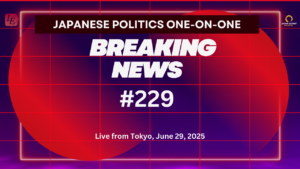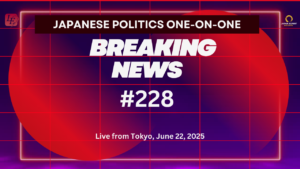Langley Esquire and Japan Expert Insights are happy to welcome you to the May 26 update on Japanese Politics.
We are in the end of May. Typically at the end of the month there’s a flurry of activity but also the end of the Diet session is less than 30 days away, June 23rd. The session is likely to be extended due to the numerous bills awaiting passage. Some of these bills are particularly surprising. Although we haven’t explored them in depth yet, now with time running out, there’s immense pressure to pass these Bills into law. I’ll be discussing some of these dynamics today. The Prime Minister continues to juggle the roaring controversy over the reform proposals from three different parties. Additionally, today is Election Day for the Shizuoka gubernatorial race, adding to the volume of the political buzz. There’s a lot to talk about, so let’s dive right into what transpired this last week:
Recap of The Kickback Scandal
To safeguard both his position and the integrity of the Liberal Democratic Party (LDP) amidst a major kickback scandal, the Prime Minister boldly disbanded all factions within the party, including his own. Demonstrating decisive leadership, he identified and punished several key culprits involved in the scandal before embarking on a critical trip to Washington, D.C. However, upon his return, the political landscape has further shaken as the LDP suffered a significant setback, losing all three seats in a long-scheduled and anticipated by-election. The scandal, which originated from within the Abe Faction, had been brewing for two decades. Throughout this time, it was strategically encapsulated into a limited timeframe to evade public scrutiny.
LDP Submits Its Own Reform Proposal
The Japanese public is clearly dissatisfied with Prime Minister Fumio Kishida and the LDP. There are widespread calls for reforms to prevent further scandals. Amidst this unrest, two prominent figures within the LDP, Shigeru Ishiba and Taro Kono, have expressed their interest in taking over Kishida’s position. Meanwhile, six opposition parties, including the Constitutional Democratic Party of Japan (CDP) and the Japanese Communist Party (JCP), are vociferously advocating for stricter campaign finance laws. They criticize the LDP’s cozy relationships with businesses and corporations, arguing that the current laws unfairly favor the LDP and stifle diversity and fairness in the political system.
To address these concerns, the LDP proposed revisions to the campaign finance law strain their relationship with their coalition partner, Komeito. Without Komeito’s support, the LDP lacks a majority in the Upper House, compelling them to seek a coalition with another party, such as Nippon Ishin no Kai (Ishin), to secure the passage of the bill… or alternatively accept the stringent proposals offered by Komeito.
LDP Wants to Pass an Imperial Succession Bill
The LDP is eager to pass an Imperial Succession Bill during this current session, addressing the pressing issue of succession within the Imperial Family, which currently lacks a male heir. Although Japan has seen female emperors in its history, this Bill delves into the complexities of how a female emperor’s husband and children would be regarded. Additionally, it scrutinizes the implications for the Koseki System, Japan’s family registry that governs inheritance, marriage and child custody (among a hundred other things).
The committee is exploring the possibility of revising the Imperial System to allow a woman’s ascension to the throne. This proposal is emerging at a time when women are increasingly active in government, business and politics in Japan. Many seasoned observers note that while Japan might seem resistant to change, structural transformations do occur under the surface. This bill is particularly significant, touching various aspects of Japanese society. It reflects a period of dynamic change, especially concerning shifts in the collective Japanese psyche.
Ethics Committee Demands Testimony from Implicated LDP Members
The Ethics Committee of the Lower House (the larger, more dominant House of Representatives) called upon 44 LDP Members to testify about their involvement in the kickback scandals. This marked a significant step toward accountability. This decision followed a successful by-election by the Constitutional Democratic Party. The CDP secured three seats and now holds one-third of the seats in the Ethics Committee. In a unanimous decision, the Committee agreed to invite the 44 LDP members to testify. However, none of these Members accepted, thus revealing their strong unwillingness to comply. The Ethics Committee lacks the authority to censure or compel individuals to appear. Still, public-opinion over this unanimous action will be harsh.
Campaign Ends in Shizuoka Election
The intense 16-day campaigning for the Shizuoka Governor ended last night, setting the stage for tomorrow’s highly anticipated election. Among the six candidates vying for the position, Omura and Suzuki have emerged as clear front runners. Omura, a former bureaucrat, has the backing of the LDP. The constitutional Democratic Part supports Suzuki, the former mayor of Hamamatsu. The remaining four candidates are not expected to pose a significant challenge.
The stakes are particularly high for the LDP, which has faced a string of electoral defeats recently. A loss in Shizuoka would further erode the party’s strength and undermine the Prime Minister’s already fragile standing. Prime Minister Kishida’s approval rating is languishing at a mere 18%. As a result, a defeat in Shizuoka could fuel speculation that he may become a lame duck, struggling to maintain authority and influence.
Shigeru Ishiba Signals Interest in Running for Prime Minister
Shigeru Ishiba, a seasoned LDP politician and one-time candidate for PM, has more loudly claimed interest in entering (if not triggering) a Prime Ministerial race. During a recent Study Session this week, Ishiba declared that it would be “impractical and unnatural” for the current Prime Minister, Fumio Kishida, to go unchallenged. This event followed the strategic dinner meeting last week with LDP bigwigs and influential LDP figures. (None of the are fond of the current PM). The issue of party leadership was the key topic of discussion at the dinner. Things are coming to a boil.
While Ishiba has made his intentions clear, the political landscape is still shifting. Younger Koizumi has opted out of the race, and Taro Kono’s plans remain ambiguous. Many expect Ishiba to face formidable competition from other potential candidates as well. In Japan’s parliamentary democracy, Members of Parliament choose the Prime Minister. With the LDP holding a plurality of votes, they effectively have the power to decide the next Prime Minister. Traditionally, LDP members vote as a bloc, usually selecting the current LDP president as their candidate. Fumio Kishida, the current LDP president, is likely to maintain his position absent significant changes (which are anticipated as “inevitable”).
Given Kishida’s low popularity, he might be replaced. Sensing opportunity, Ishiba is rallying his supporters and preparing a campaign. To officially submit his candidacy, he will need to secure 20 signatures from Members, a task he is diligently working towards as he positions himself for a potential leadership challenge.
Japan Pushes to Revise Technical Intern Training Program
The Japanese government has long invited low-level workers from overseas through a technical intern training program. This has been in an effort to provide them with skills while they work in factories. However, this program has faced significant criticism for the mistreatment of interns. It has also been a focus of criticism for the barriers it creates to their assimilation into Japanese society. In response to these issues, the government has introduced a revised law. The law should make it easier for technical interns to obtain permanent residency. This new program is set to replace the 34-year-old technical intern program. This reflects a shift in policy to better integrate foreign workers. This is essentially an admittance that Japan is weakening due to the shrinking population.
Japan’s economy, currently grappling with a shortage of workers for essential jobs, has made this change necessary. By facilitating a pathway to permanent residency, the government hopes to attract and retain foreign workers. Through this, they hope to address the labor deficit and supporting the nation’s economic stability. Let’s see how this works and if the supporting structure similarly develops to assist with the assimilation component. Doubts run high.
Yen Remains Nearly Unchanged at 157 to Dollar
The value of the yen has dropped significantly, causing the cost of imported goods and production inputs to skyrocket. This situation has the Japanese government deeply concerned about the high expenses associated with foreign products and inputs-to-production. As G7 Finance Ministers and Central Bankers convene in Italy to address this pressing issue, Japan has issued a stern warning that it cannot tolerate the continued devaluation of the yen.
Previously, Bank of Japan Governor and Japan’s Finance Minister met with their G7 counterparts in Washington, D.C. There, they (together with S. Korea) were advised against taking unilateral action to bolster their currencies. Despite this guidance, the Japanese government took decisive steps to intervene in the market. The intervention resulted in a temporary increase in the yen’s value about 4 weeks ago (reported here). The full extent of this intervention will be detailed in the Bank of Japan’s monthly report, due at the end of the month. It will be a woozie.
The grander G7 is approaching: the Chair will pass from Kishida to Brazil President Luiz Inácio Lula da Suza). The Prime Minister faces the critical task of defending Japan’s actions and explaining the necessity of intervention to support the yen. This defense is crucial as Japan navigates the complex dynamics of international finance and seeks to stabilize its economy amidst fluctuating currency values. In other words, there are battles on several fronts.
Japan, South Korea, China Summit This Week
This week, China, South Korea and Japan will hold a trilateral summit in Seoul. The Japanese Prime Minister will be attending to meet with his counterparts. The summit will cover nine areas of cooperation, and thorny issues (not on The List) will probably surface.
Tensions have been high, with China criticizing Japan for 31 Diet Members traveling to Taiwan’s recent presidential inauguration (last Monday). Japan voiced concerns over China’s alignment with Russia. This follows Putin’s visit to Beijing and the ban they placed on all Japanese fish stocks. This geopolitical friction has led to consequences such as forcing Japan to sell food-products below market price with the support from the United States. (These banned food-items are appearing on menus of US soldiers throughout the world now.)
Additionally, a significant military show of force near Taiwan by China and Japan’s recent participation in the large-scale US military exercise Valiant Shield for the first time further contributes to the escalating tensions. And this is all just this last week!
Amidst these developments, the trilateral summit aims to address and mitigate these escalating tensions, fostering dialogue and cooperation among the three nations. The first in 5 years, so it is a welcome development.
2+2 Scheduled in Tokyo (Defense + Foreign Ministers)
A significant event is on the horizon as Tokyo hosts a 2+2 meeting in July. The meeting will involve the Defense and Foreign Ministers from both countries: the US and Japan. These meetings are pivotal. They bring together key figures from both defense and statecraft sectors to discuss and coordinate on critical issues. Given the current geopolitical climate and the various tensions Japan is navigating, the upcoming meeting in Tokyo is expected to be particularly important. This gathering will provide a platform for comprehensive discussions on defense strategies, economic policies, and collaborative efforts to address regional and global challenges.
Crown Prince of Saudi Arabia Postpones His Trip to Japan
Crown Prince Mohammed bin Salman of Saudi Arabia has postponed his anticipated three-day visit to Japan. The visit was going to begin tomorrow, due to experiencing congestion. Extensive preparations were underway for his arrival. They included a tremendous lineup of Mercedes limousines seen going through practice-runs on Tokyo streets early in the morning, underscoring the significance of his visit. The Prince apparently does not travel light.
Although not a State Visit (MBS is not Head of State), the Crown Prince’s visit holds considerable importance. He was scheduled to have lunch with the Emperor and Empress and meet with the Prime Minister. The postponement has delayed these significant engagements, which highlight the close diplomatic and economic ties between Saudi Arabia and Japan.
Questions & Comments
- What concerns in Japan are there with the announcement of Biden’s 100% tariff on China’s electric vehicles and other critical minerals? How might this impact Japan’s auto and semiconductor industry?
- I am dialing-in from Taiwan: I never notice or know about the military drills and the hugely aggressive China attempts to intimidate Taiwan; if it were not for you talking about military operations, I would never know. Business and life are going peaceful here. Any comment you can share?
- If Kono Taro were Prime Minister, would there be fewer controversies due to his leadership style?
- Regarding the kickback scandal and the reform panel, is there any diplomatic way to achieve a positive outcome?
- Some BRICS nations are adopting de-dollarization… moving away from the US as providing the global currency. Could this benefit the yen, hypothetically?
- What does Kishida see in the current situation that leads him to consider a snap election as a “good” option? I don’t quite grasp it.
- What is the impact of Koike running (or NOT running!) for Governor again in the upcoming election (7/7)? Why is the NHK party increasing its visibility recently?
- Will these developments you have been discussing lead to any changes in the Kishida Administration?
- Regarding the “mutual support” discussions on the Agenda during the Japan/ South Korea/China discussions, in the area of natural-disaster mutual support, do you foresee any particular events/developments after or arising as-a-consequence of this trilateral meeting? This is a big issue for me and I am deeply curious.
- Regarding political funds and politicians, the normal income tax can be revisited from 6 to 7 years by the NTA during their investigations. So, why was the scope on the kickback scandal limited to only 2.5 years? How and why was this decided?
- Can you discuss the public relations budget of defense sales managers and its impact on knowledge production through the media?
- BRICS membership is expanding and, at the same time, the US State Department’s aggressive stance leads me to think the dollar might be headed to becoming a “second option” for, i.e., purchasing oil on the open market, or being the currency of choice for clearance-purposes. What are your thoughts?
If you gain insight from these briefings, consider a tailored one for your Executive Team or for passing-through-Tokyo heavyweights.
To learn more about advocacy and lobbying in Japan, visit this page.
Join the Success!
Experience exceptional, personalized solutions designed to meet your business’s specific needs. Discover how we can elevate your operations to the next level.




